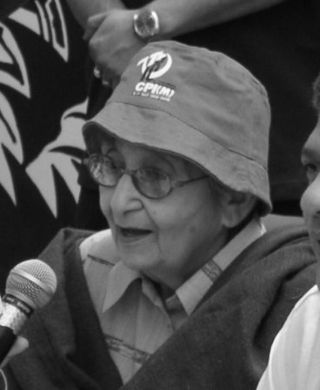Sehgal, also spelled Segal or Saigal, is a Punjabi Khatri surname, originating from Punjab in India and Pakistan. [1]
Sehgal, also spelled Segal or Saigal, is a Punjabi Khatri surname, originating from Punjab in India and Pakistan. [1]

Lakshmi Sahgal was a revolutionary of the Indian independence movement, an officer of the Indian National Army, and the Minister of Women's Affairs in the Azad Hind government. Lakshmi is commonly referred to in India as Captain Lakshmi, a reference to her rank when taken prisoner in Burma during the Second World War.
Bhat is a surname in the Indian subcontinent. Bhat and Bhatt are shortened renditions of Brahmabhatta or Bhatta.
Bajwa is a Jat surname and tribe name commonly found among the Sikhs, Muslims of the Punjab region in India and Pakistan.
Dhillon is a one of the largest Jat clans found in the Punjab region of India and Pakistan. Dhillon sardars (chiefs) ruled the Bhangi Misl in the Sikh confederacy.
Khan is a surname of Turko-Mongol origin, today most commonly found in parts of India, Pakistan, Afghanistan, Bangladesh, Uzbekistan and Iran. It is derived from the historic title khan, referring to military chief or royalty. It originated as a hereditary title among nomadic tribes in the Central and Eastern Eurasian Steppe during antiquity and was popularized by Afghan dynasties in the rest of Asia as well as in Eastern Europe during the medieval period.
Malhotra is an Indian surname of the Dhai Ghar sub-group of Khatris from Punjab. Malhotra is the modified version of Mehrotra.
Kapoor or Kapur is a Punjabi surname of Khatri caste found in the Punjabi Hindu and Sikh communities.
Cheema is a Punjabi Jatclan of India and Pakistan.
Chaudhary is a common surname in the Indian subcontinent, originally derived from an Indian hereditary title. "Chaudhary" is a term adapted from the Sanskrit word caturdhara, literally "holder of four". 'Chaudhary' was first bestowed by the various rulers of the Delhi Sultanate, and the custom was continued by the breakaway Bengal Sultanate. Later, the Mughals and the Nawabs conferred the same title in great numbers. Chaudharies were "local magnates" responsible for land taxes alongside an amil and a karkun (accountant) in the local-level administrative units known as parganas.
Puri is an Indian Punjabi surname of Kshatriya varna, derived from a Chandravanshi Indo Aryan Puru tribe of King Porus.
Dutta, also spelled Datta, is an Indian family name Its variation is Dutt.
Sethi is a surname that is found among the Punjabi Khatris of India. They are a part of Khukhrain sub-caste among the Khatris which also includes the clans of Anand, Bhasin Chadha, Kohli, Ghai, Sahni, Sethi, (Sawhney) and Suri. Most of Sethis are Dual-faith Hindus. Some Sethis also follow Islam. The surname is also found among Arora. Historian Kamal Shankar Srivastava writes that all Khukrains including Sethis were originally found near the banks of Indus and Jhelum river especially in the towns of Pind Dadan Khan, Peshawar and Nowshera.
Tandon is a surname found among Hindu Khatris and Sikhs of Punjab, India.
Bagga is a surname of Punjabi people found in Punjab (India) and Punjab (Pakistan).
Chadha is an Indian surname that is used by the Punjabi Khatri caste. Notable people who bear the name, but are not necessarily associated with the caste, include:
Malik is a surname deriving from the Arabic word malik, meaning "king" or "chieftain". The title "Malik" was granted to many Jats in India, and began to be used a surname in the 14th century. Malik is also found in Ror people of Haryana.
Chopra is a Ror and Punjabi Khatri surname. They belonged to the (Barah-Ghar) Bahri family-group of the Khatris, which also includes the clans of Dhawan, Kakkar, Kapoor, Khanna, Mehra, Malhotra, Sehgal, Seth, Tandon, Talwar, and Vohra.
Notable people with the surname Arora include:
Talwar is an Indian surname originating in the Khatri and Sikh communities of Punjab. It is derived from the word "talvar" meaning sword.
Sandhu or Sindhu is the second largest clan of Jats in the Punjab region of India and Pakistan. The Sandhus played an important role in the Sikh history. During the period of the Sikh Confederacy, Sandhus ruled several sovereign states (misls) including the Nakai Misl, Shaheedan Misl and the Kanhaiya Misl.